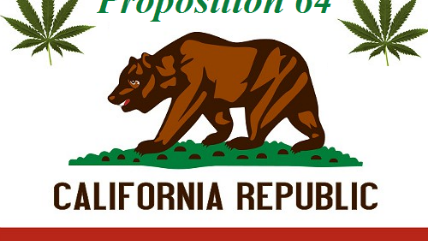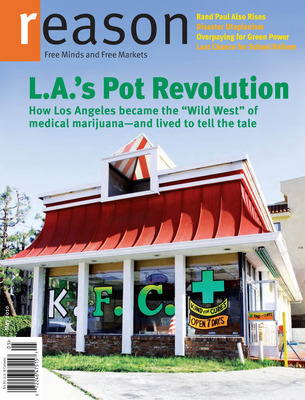Lessons From California's Pending Pot Legalization
Was it really only six years ago when recreational pot got smacked down in the Golden State by a giggling political class?


Six years ago, my legendarily goofball home state of California, which introduced the medical marijuana loophole to the world back in 1996, was on the verge of rejecting the first honest-to-goodness attempt in at legalizing recreational weed in the 21st century. In a last-ditch effort to rally the troops, Nick Gillespie and I wrote a piece for The Huffington Post arguing that "Pot Legalization Is the Most Important Issue Before Voters This Election Day," a claim that got me subjected to ridicule (which I think I effectively pushed back on) from Fox Business Network's Stuart Varney. In fact, I think our argument holds up pretty well:
Though limited to voters in a single state, Prop. 19 is the only policy matter on the table with the potential to restructure the lives of virtually all Americans. If Prop. 19 passes, it will force, at long bloody last, an honest reconsideration of failed prohibitionist policies throughout the United States. In fact, given the drug war's influence on our foreign policy in Latin America and central Asia, Prop. 19's reverberations would even be felt far outside our borders. […]
A legalization win in California, or even a close call, will certainly spread to other states, including ostensibly conservative red states. […]
Given marijuana's presence in every part of the country, legalization is not a question of if but when.
Six years later, California is poised to become the fifth state in the country to legalize pot, via Prop. 64, which would more than triple the population of Americans living in recreationally legal states. (For a breakdown of the electoral possibilities, Jacob Sullum's recent post "Where Voters Are Likeliest to Legalize Marijuana in a Month.") On this happy occasion I have taken to the pages of the L.A. Times to celebrate the impending victory, and talk about three broader lessons about policy change we might learn. Excerpt:
1) Push for (and tolerate) experimentation. […]
What's the 2016 equivalent of medical marijuana shops? Charter schools come quickly to mind. Wherever the one size is not fitting all to the end user's satisfaction, there is an opportunity for governmental bodies to allow for some real or metaphorical outside lab work. Beware any entity that would prematurely close such experiments down. […]
3) Endure (or please knock off) the giggling. The great unspoken truth about mainstream politics is that even if a policy is supported by a majority of Americans, if it has for whatever reason become taboo among the political class, those who advocate for it will be laughed at. Scratch that, giggled at. […]
When Arnold Schwarzenegger announced his opposition to Proposition 19, he used a telling phrase: California, he warned, would become a "laughingstock." The Golden State's august newspaper editorial boards, which opposed the initiative almost unanimously, could not resist the most obvious jokes this side of Woody Allen one-liners about Los Angeles.
Check out the whole thing here.
Readers with long memories (or who worked backward from the links in Scott Shackford's recent post about it) may recall my obsession six years ago with pointing out the juvenile pot jokes on all the Golden State's anti-Prop. 19 newspaper editorials ("No to Ganja Madness!" and "One Toke Over the Line" and on and on and on). Well, this year, I'm happy to report, most of the editorial takes—which have been running about 50-50 pro/con—have at least been more sober. But I can't help sharing this recent effort from the prohibitionist Fresno Bee: "Vote 'no' on half-baked Proposition 64." GET IT???
Below watch Zach Weissmueller's interview two months ago with Lynne Lyman, California state director for the Drug Policy Alliance, about what a victorious Prop. 64 would mean:


Show Comments (25)